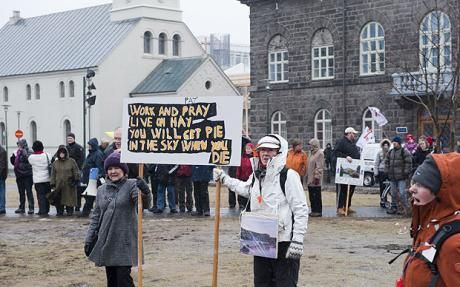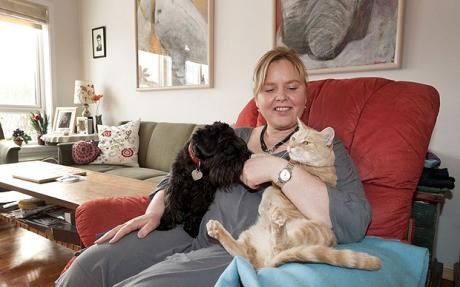THE TELEGRAPH: "I don't tell my children where I get the food, I'm too ashamed," said Iris Aegisdottir, an Icelander who has been going to a food bank every week for a year to feed her three children.

The crisis that brought down Iceland's economy in late 2008 threw thousands of formerly well-off families into poverty, forcing people like Iris to turn to charity to survive.
Each week, up to 550 families queue up at a small white brick warehouse in Reykjavik to receive free food from the Icelandic Aid to Families organisation, three times more than before the crisis.
Rutur Jonsson, a 65-year-old retired mechanical engineer, and his fellow volunteers spend their days distributing milk, bread, eggs and canned food donated by businesses and individuals or bought in bulk at the supermarket.
"I have time to spend on others and that's the best thing I think I can do," he said as he pre-packed grocery bags full of produce.
In a small, close-knit country of just 317,000 people, where everyone knows everyone, the stigma of accepting a hand-out is hard to live down and of the dozens of people waiting outside the food bank in the snow on a dreary March afternoon, Iris is the only one willing to talk.
"It was very difficult for me to come here in the beginning. But now I try not to care so much anymore," said the weary-looking 41 year-old, who lost her job in a pharmacy last summer, as she wrung her hands nervously.
The contrast is brutal with the ostentatious wealth that was on display across the island just two years ago, as a hyperactive banking sector flooded the small, formerly fishing-based economy with fast cash.
Back then, the biggest worry for many Icelanders was who had the nicest SUV, or the most opulent flat.
But today visible signs of poverty are quickly multiplying in the Nordic island nation, despite its generous welfare state, as the middle class is increasingly hit by unemployment, which is up from one to nine per cent in about a year, and a large number of defaults on mortgages. >>> Marc Preel, in Reykjavik for AFP | Thursday, April 08, 2010
THE TELEGRAPH: Anna Margret Bjoernsdottir never thought she would be forced to leave her once wealthy homeland. But taking out a loan in a foreign currency was a disastrous decision.

After 18 months of economic upheaval she has decided to join the biggest emigration wave from Iceland in more than a century.
"I just don't see any future here. There isn't going to be any future in this country for the next 20 years, everything is going backwards," lamented the 46-year-old single mother, who plans to move to Norway in June.
The former estate agent who lost her job when Iceland's housing market disintegrated two years ago said that she feared she could soon be forced out of her large house in Mosfellsbaer, around 15 kilometres (nine miles) from Reykjavik.
"I don't want to sell it," she said, vowing to "fight to keep" the comfortable wooden dwelling she, her daughter Olavia, their cat, Isolde Tinna, and their dog, Candit the Bandit, have called home since 2004.
Bjoernsdottir is not alone in planning to leave Iceland's economic mess behind and seek a new future abroad. Most people in Reykjavik have someone in their surroundings who has already packed their bags and gone. >>> Marc Preel, in Mosfellsbaer for AFP | Wednesday, April 08, 2010